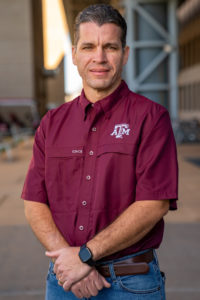AgriLife Extension adds entomologist in Amarillo
Santiago González to foster regional collaboration for integrated pest management
José Santiago González, Ph.D., joined Texas A&M AgriLife Extension Service as an entomologist on Jan. 4.

He will support integrated pest management efforts across the region out of the Texas A&M AgriLife Research and Extension Center in Amarillo.
David Kerns, Ph.D., AgriLife Extension state integrated pest management coordinator and professor in the Department of Entomology, said Santiago González brings a strong pest management background to the position.
“Dr. Santiago González is very agricultural producer and consultant oriented, having earned his doctorate in an Extension entomology program,” Kerns said. “I am very pleased to have him with us as a member of the Texas A&M Department of Entomology and as an AgriLife Extension specialist serving the agricultural producers of the Texas Panhandle.”
Santiago González said his initial focus will be to engage area producers, AgriLife Extension agents and other stakeholders to build a strong network focused on providing solutions through integrated pest management. He also hopes to create localized research field trials to test a suite of pest management strategies, including cultural, biological and chemical controls for crops.
“Good research provides good information for the farmer,” he said. “I look forward to collaborating with the farmers, our AgriLife Extension agents, and the team at the Amarillo center. I am focused on helping, but I also think I will learn so much from this network I hope to establish in the region.”
Santiago González brings expertise, experience
Santiago González recently received his doctorate from the Department of Entomology at the Texas A&M College of Agriculture and Life Sciences, but he also has an array of experience in the field. Between 2006 and 2017, he oversaw various crop management activities including pest control, irrigation and agronomy for companies like Banana Land, Third Millennium Genetics, Syngenta Seeds and Agro-Banana in Puerto Rico.
Much of his early work experience revolved around controlling pests and diseases in plantains and bananas, but he has also worked in traditional commodity crops grown in Puerto Rico for seed, including corn, sorghum, soybeans, rice, sunflowers and tomatoes for canning.
Resistance to insecticides and traits like Bt were a major problem in Puerto Rico due to year-round intensive crop production regimens and conducive temperature, he said. The Panhandle may present crop protection problems, but he said his experience in pest control in tropical climates has prepared him for the challenge ahead.
“Managing pests in the tropics is a difficult task because there is no break,” he said. “There is no winter to knock back their numbers. I believe the lessons learned in controlling crop pests on the island, the wins and losses, have broadened my knowledge in the field and those experiences could help me to better serve farmers in the Texas Panhandle.”
After 11 years in the industry, Santiago González pursued his doctorate at Texas A&M under Kerns to study insect resistance to Bt proteins. He also worked on insecticide and varietal efficacy evaluations focused on pests ranging from corn rootworm, thrips, cotton bollworm and flea hoppers in cotton, sorghum aphids in sorghum, and stink bugs in soybeans.
Santiago González earned a bachelor’s degree in horticulture and a master’s degree in crop protection from the University of Puerto Rico in Mayagüez, where he received several honors for his academic work. He is a member of the Entomological Society of America and the Puerto Rican Society of Agricultural Sciences. His research work has been published in more than a dozen scientific articles.
“I expect to serve as a collaborative resource in the Panhandle,” he said. “I think having worked in the industry and returning to university for my Ph.D. helped me develop into a well-rounded agriculture-oriented professional. I look forward to working with producers, consultants, specialists, county agents and faculty to help generate and disseminate knowledge for improving the profitability of agriculture in the Texas Panhandle.”


